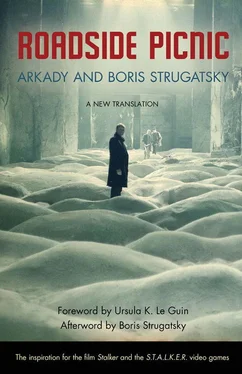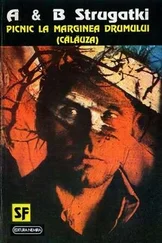Arkady and Boris Strugatsky
ROADSIDE PICNIC
Goodness…. You got to make it out of badness…. Because there isn’t anything else to make it out of.
—Robert Penn Warren
FOREWORD
BY URSULA K. LE GUIN
Part of this foreword is taken from a review of Roadside Picnic I wrote in 1977, the year the book first came out in English. [1] Roadside Picnic was first published in England and America in 1977, in a translation by A. W. Bouis. My review, “A New Book by the Strugatskys” is in Science Fiction Studies 12 (vol. 4, pt. 2, July 1977).
I wanted to keep some record of a reader’s response at a time when the worst days of Soviet censorship were fresh in memory, and intellectually and morally interesting novels from Russia still had the glamour of risk-taking courage about them. A time, also, when a positive review of a work of Soviet science fiction was a small but real political statement in the United States, since part of the American science fiction community had undertaken to fight the Cold War by assuming every writer who lived behind the Iron Curtain was an enemy ideologue. These reactionaries preserved their moral purity (as reactionaries so often do) by not reading, so they didn’t have to see that Soviet writers had been using science fiction for years to write with at least relative freedom from Party ideology about politics, society, and the future of mankind.
Science fiction lends itself readily to imaginative subversion of any status quo. Bureaucrats and politicians, who can’t afford to cultivate their imaginations, tend to assume it’s all ray-guns and nonsense, good for children. A writer may have to be as blatantly critical of utopia as Zamyatin in We to bring the censor down upon him. The Strugatsky brothers were not blatant, and never (to my limited knowledge) directly critical of their government’s policies. What they did, which I found most admirable then and still do now, was to write as if they were indifferent to ideology—something many of us writers in the Western democracies had a hard time doing. They wrote as free men write.

Roadside Picnic is a “first contact” story with a difference. Aliens have visited the Earth and gone away again, leaving behind them several landing areas (now called the Zones) littered with their refuse. The picnickers have gone; the pack rats, wary but curious, approach the crumpled bits of cellophane, the glittering pull tabs from beer cans, and try to carry them home to their holes.
Most of the mystifying debris is extremely dangerous. Some proves useful—eternal batteries that power automobiles—but the scientists never know if they are using the devices for their proper purposes or employing (as it were) Geiger counters as hand axes and electronic components as nose rings. They cannot figure out the principles of the artifacts, the science behind them. An international Institute sponsors research. A black market flourishes; “stalkers” enter the forbidden Zones and, at risk of various kinds of ghastly disfigurement and death, steal bits of alien litter, bring the stuff out, and sell it, sometimes to the Institute itself.
In the traditional first contact story, communication is achieved by courageous and dedicated spacemen, and thereafter ensues an exchange of knowledge, a military triumph, or a big-business deal. Here, the visitors from space, if they noticed our existence at all, were evidently uninterested in communication; perhaps to them we were savages, or perhaps pack rats. There was no communication; there can be no understanding.
Yet understanding is needed. The Zones are affecting everyone who has to do with them. Corruption and crime attend their exploration; fugitives from them are literally pursued by disaster; the children of the stalkers are genetically altered until they seem scarcely human.
The story set on this dark foundation is lively, racy, unpredictable. The setting appears to be North America, perhaps Canada, but the characters have no particular national characteristics. They are, however, individually vivid and likeable; the slimiest old stalker-profiteer has a revolting and endearing vitality. Human relations ring true. There are no superbrilliant intellects; people are commonplace. Red, the central figure, is ordinary to the point of being ornery, a hard-bitten man. Most of the characters are tough people leading degrading, discouraging lives, presented without sentimentality and without cynicism. Humanity is not flattered, but it’s not cheapened. The authors’ touch is tender, aware of vulnerability.
This use of ordinary people as the principal characters was fairly rare in science fiction when the book came out, and even now the genre slips easily into elitism—superbrilliant minds, extraordinary talents, officers not crew, the corridors of power not the working-class kitchen. Those who want the genre to remain specialized—”hard”—tend to prefer the elitist style. Those who see science fiction simply as a way of writing novels welcome the more Tolstoyan approach, in which a war is described not only from the generals’ point of view but also through the eyes of housewives, prisoners, and boys of sixteen, or an alien visitation is described not only by knowledgeable scientists but also by its effects on commonplace people.
The question of whether human beings are or will be able to understand any and all information we receive from the universe is one that most science fiction, riding on the heady tide of scientism, used to answer with an unquestioning Yes. The Polish novelist Stanislaw Lem called it “the myth of our cognitive universalism.” Solaris is the best known of his books on this theme, in which the human characters are defeated, humbled by their failure to comprehend alien messages or artifacts. They have failed the test.
The idea that the human race might be of absolutely no interest to a “more advanced” species could easily lend itself to overt sarcasm, but the authors’ tone remains ironic, humorous, compassionate. Their ethical and intellectual sophistication becomes clear in a brilliant discussion, late in the novel, between a scientist and a disillusioned employee of the Institute about the implications, the meaning, of the alien visit. Yet the heart of the story is an individual destiny. The protagonists of idea-stories are marionettes, but Red is a mensch. We care about him, and both his survival and his salvation are at stake. This is, after all, a Russian novel.
And the Strugatskys raise the ante on Lem’s question concerning human understanding. If the way humanity handles what the aliens left behind them is a test, or if Red, in the final, terrible scenes, undergoes trial by fire, what, in fact, is being tested? And how do we know whether we have passed or failed? What is “understanding”?
The final promise of “HAPPINESS, FREE, FOR EVERYONE” rings with unmistakably bitter political meaning. Yet the novel can’t possibly be reduced to a mere fable of Soviet failure, or even the failure of science’s dream of universal cognition. The last thing Red says in the book, speaking to God, or to us, is “I’ve never sold my soul to anyone! It’s mine, it’s human! Figure out yourself what I want—because I know it can’t be bad!”
AN EXCERPT FROM AN INTERVIEW WITH DR. VALENTINE PILLMAN BY A CORRESPONDENT FROM HARMONT RADIO, AFTER THE FORMER RECEIVED THE 19—NOBEL PRIZE IN PHYSICS.
Читать дальше















